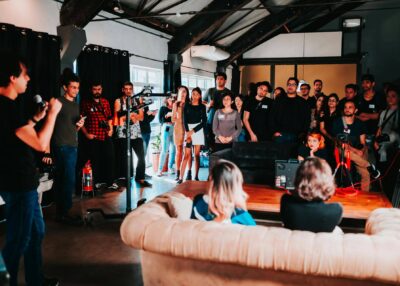9 SEO Tips to Boost Attendance at Your Holiday Event
When it comes to promoting a holiday event, SEO (Search Engine Optimization) is one of the most powerful tools you can use to increase visibility and attract a wider audience. With the right SEO practices, you can make sure that your event stands out online and reaches potential attendees who are searching for holiday experiences.
Whether you’re planning a Christmas market, a Thanksgiving dinner, or a New Year’s Eve party, these SEO strategies can help you attract more people to your holiday event.
1. Optimize Event Pages for Relevant Keywords
The foundation of any successful SEO strategy is keywords—these are the terms people use when searching for events. For holiday events, this could include phrases like “holiday markets near me,” “Christmas concert in [your city],” or “New Year’s Eve party [your city].”
How to find relevant keywords:
- Google Keyword Planner: Use this free tool to identify keywords that have a high search volume.
- Google Trends: Analyze trending topics related to the holidays and see what people are searching for in real time.
- Event-specific keywords: Make sure your keywords are specific to your event, incorporating terms like "free," "family-friendly," or "VIP access."
Once you’ve identified your keywords, incorporate them naturally into the following areas:
- Page titles
- Meta descriptions
- Event descriptions
- Headers (H1, H2, H3)
- Image alt text
- URL slugs
Using geo-targeted keywords that mention your city or neighborhood helps attract local traffic. For example, if you’re hosting a Christmas market in New York City, make sure “NYC Christmas market” or “Christmas events in NYC” appear in your event page content.
2. Create Event-Specific Landing Pages
A well-optimized, standalone landing page for your holiday event can help your event rank higher in search results. Ensure that this page is dedicated solely to your event, providing all relevant details and optimized content for both users and search engines.
What to include:
- Compelling event title with relevant keywords.
- Date, time, and location details, including parking and transportation information to help local SEO.
- Event highlights: What makes your event special? Include VIP experiences, giveaways, food trucks, or unique performances.
- Calls to action (CTAs): Make it easy for people to sign up or purchase tickets with clear buttons like “Get Tickets” or “RSVP Now.”
- Social proof: Include testimonials, reviews, or user-generated content from past events to build credibility.
-
Schema markup: Implement event-specific structured data to ensure that search engines can display rich snippets like event dates, ticket prices, and locations in the search results. Google provides event markup guidance to help with this.
By creating a focused, content-rich landing page, you provide users with everything they need to know, while also sending strong SEO signals to search engines.
3. Build a Blog Around Your Holiday Event
Creating blog content around your event is a great way to rank for more keywords and drive additional organic traffic. Consider writing blog posts that tie into your event, giving you a chance to use more keywords and attract different types of visitors.
Blog ideas for holiday events:
- “Top 10 Holiday Events in [City] You Can’t Miss This Year”: Feature your event alongside others to increase its visibility.
- “What to Expect at [Event Name]”: Write an in-depth guide that details all the attractions, performers, and activities at your holiday event.
-
“How to Plan the Perfect Holiday Weekend”: Include your event in a broader holiday itinerary, appealing to travelers or locals looking for holiday activities.
Remember to promote your blog posts across social media and link back to your event page to boost SEO.
4. Leverage Local SEO Techniques
Local SEO is essential for holiday events, as most attendees will be searching for events happening in their area. To boost local search results, focus on optimizing for local SEO.
How to improve local SEO:
- Google My Business (GMB): Claim your event on Google My Business. This helps you show up in Google Maps and local search results. Be sure to add your event’s address, hours, website link, and any other relevant information.
- Local event listings: Submit your event to local event calendars and listings, such as Eventbrite, Facebook Events, and TimeOut. These sites often rank highly for event searches and can drive significant traffic back to your event page.
- Citations: Ensure your event's name, address, and phone number (NAP) are consistent across the web, including social media and listing platforms, as this boosts your local SEO credibility.
-
Online reviews: Encourage attendees to leave reviews about past events on platforms like Google, Yelp, or Facebook. Positive reviews can help your event rank higher locally.
5. Use High-Quality Images and Videos
Holiday events are visual by nature, and search engines value high-quality multimedia content. Photos of past events, promotional videos, and even live streams can help boost engagement and SEO rankings.
Tips for multimedia SEO:
- Optimize file names and alt text: Use descriptive, keyword-rich file names and alt text for all your images and videos, making them more discoverable in image and video searches.
- Embed event videos: Post video highlights from past events or promotional content on your event page or blog. Video content is a powerful way to engage users and keep them on your site longer, which positively affects your SEO.
-
Use YouTube: Since YouTube is the second-largest search engine after Google, upload event-related videos to YouTube with optimized titles, descriptions, and tags. Be sure to include a link to your event page in the video description.
6. Promote Your Event on Social Media
While social media itself isn’t a direct SEO ranking factor, it plays a huge role in driving traffic and engagement, both of which can influence your SEO indirectly. Consistently share updates and promotions for your event across platforms like Facebook, Instagram, Twitter, and TikTok.
Social media SEO tips:
- Optimize your profiles: Ensure that your social media profiles include relevant keywords and a link to your event page.
- Share regularly: Post updates about your holiday event, including giveaways, behind-the-scenes content, and announcements. Use relevant hashtags to reach a broader audience.
- Encourage social sharing: Create content that attendees will want to share, such as countdowns, sneak peeks, or exclusive promotions. The more your event is shared the more potential for backlinks and traffic to your event page.
- Engage with influencers: Partner with local influencers or bloggers who can promote your event to their followers. Their content can drive referral traffic, increasing your chances of ranking higher in searches.

7. Build Backlinks to Your Event Page
Backlinks, or links from other websites to your event page, are one of the most important factors for SEO. The more high-quality, relevant websites that link to your event, the higher you’ll rank in search results.
How to get backlinks:
- Reach out to local blogs and publications: Ask if they would feature your holiday event in their seasonal event roundups or guides.
- Collaborate with sponsors and partners: If your event has sponsors, vendors, or performers, ask them to link to your event page from their own websites.
-
Submit press releases: Create a press release about your holiday event and submit it to online news outlets or event blogs that might link back to your page.
8. Focus on Mobile Optimization
More people are browsing the web via mobile devices than ever before, and Google uses mobile-first indexing, meaning your mobile site’s performance is a major factor in how your event ranks in search results.
How to optimize for mobile:
- Responsive design: Ensure your event page is mobile-friendly and adjusts to different screen sizes.
- Fast loading times: Use tools like Google PageSpeed Insights to test your site’s speed. Slow load times can negatively affect your ranking, so consider compressing images or using a Content Delivery Network (CDN) to improve performance.
-
Easy navigation: Simplify the layout of your mobile site so users can easily find the most important information, such as the event date, location, and ticket purchase links.
9. Monitor and Adjust Your SEO Strategy
Finally, SEO is an ongoing process, and it’s essential to monitor your efforts regularly. Use tools like Google Analytics, Google Search Console, and SEMrush to track your rankings, monitor traffic, and identify areas for improvement.
Metrics to track:
- Organic traffic: How much traffic is coming to your event page from search engines?
- Bounce rate: Are people leaving your page quickly, or are they engaging with the content?
- Conversion rate: How many people are buying tickets or signing up for your event after visiting the page?
Regularly check these metrics and adjust your SEO strategy as needed to ensure your holiday event continues to attract the most attendees.
Conclusion
Using SEO effectively for your holiday event can be the key to reaching more people and ensuring your event is a success. From optimizing keywords and local SEO strategies to promoting multimedia content and building backlinks, these techniques will help boost your visibility online and attract more attendees.
By investing time and effort into SEO, you can make your holiday event a standout experience for everyone who finds it.






